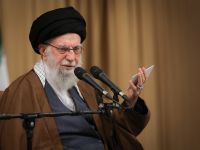At least three Saudi detainees have started a hunger strike in prison to protest charges brought against them that they describe as arbitrary.
Human rights defender Khalid Al-Omair, detained since 2018, managed to smuggle out a message that he scribbled on tissue paper stating the purpose and demands of his hunger strike.
Incredible message from detained Saudi activist Khaled al-Omair, written on tissue & secretly sent from jail.
— Josh Cooper (@joshcooperate) December 22, 2019
Announces start of hunger strike until his release, having been detained for 18 months w/o charge.
Joins fellow POCs on #SaudiPOCsHungerStrike.#StandWithSaudiHeroes pic.twitter.com/ORMrNsolI2
"I have been detained for longer than the legal period without charge and without being brought to court," he wrote in his letter. "I refuse to recognise the Counterterrorism Law and other, similar laws because they are designed to silence anyone with an opinion that differs from the government’s opinion."
Al-Omair's case dates back to 2008 when he was arrested and sentenced to eight years for planning a demonstration to protest the blockade in Gaza. He filed a complaint claiming he was tortured while in prison. But instead of investigating, it appears security forces detained him instead and he's been in prison ever since, according to Gulf Centre for Human Rights.
Al-Omair's letter states that he started his hunger strike on December 22 and will only end it once he's unconditionally released. He also requested to meet with a UN human rights envoy after having been ignored by prison administrators.
Two other prominent activists have also started hunger strikes earlier in the month after allegedly being tortured, according to human rights group Alqst.
The hunger strike of three activists @WaleedAbulkhair, @raif_badawi & Khaled al-Omair continues, protesting against the ongoing violations of their rights in jail.
— ALQST for Human Rights (@ALQST_En) December 23, 2019
Share a message of support using the hashtags:#SaudiPOCsHungerStrike
#إضراب_سجناء_الرأي #StandWithSaudiHeroes pic.twitter.com/nlBq6y9te7
One of them is Waleed Abulkhair, a lawyer and head of the Monitor of Human Rights in Saudi Arabia organization, who was sentenced to 15 years for inciting public opinion and undermining the regime.
He was also defending Saudi blogger Raif Badawi in his legal battle, who happens to be the other activist currently on hunger strike. Badawi was the creator of an online forum called Saudi Liberal Network. In 2014 he was given 10 years in prison and 1000 lashes for insulting Islam.
Hunger strike movements are also springing up in Egyptian prisons where 10 women have started their own protest to highlight ill-treatment and being denied access to legal rights.
Local activists and rights groups say the women in Cairo's Qanater prison are resorting to a hunger strike as a "last resort."
One of the women is Radwa Mohamed who suddenly disappeared after videos of her criticizing Egyptian president el-Sisi and his wife went viral in November. The hashtag #WhereIsRadwa began trending at the time. It turns out she was arrested on suspicion of spreading false news.
لحظة القبض على رضوي واستغاثتها #رضوي_فين pic.twitter.com/ubapTGTHdf
— The Lens - العدسة (@TheLensPost) November 13, 2019
Translation: "The moment Radwa was arrested in distress." [VOICE]: "The Central Security Forces are here. Mohammed, can you hear me? The Central Security Forces are here. I'm terrified."
Many of the women are students, lawyers and journalists, who have in some capacity been critical of the regime. But authorities in Egypt have denied accounts of there being a hunger strike among women prisoners or of inhumane treatment of inmates.
International rights groups have often criticized Saudi and Egypt's arbitrary detainment and ill-treatment of political prisoners and activists. Amnesty International has called on Saudi to release its prisoners of conscience and repeatedly condemned Egypt's mass arrests of el-Sisi's opponents.








